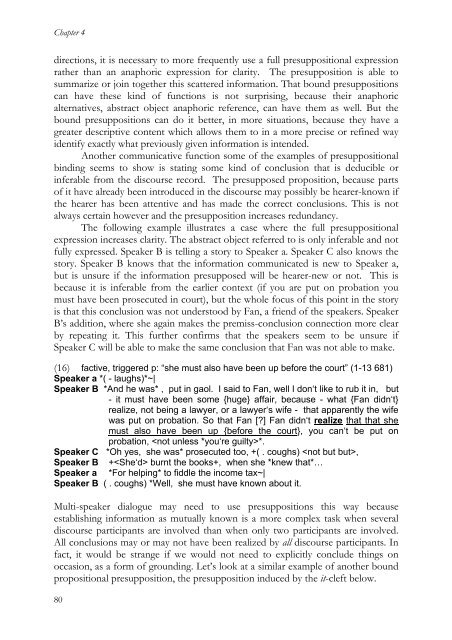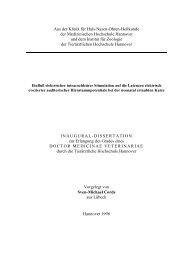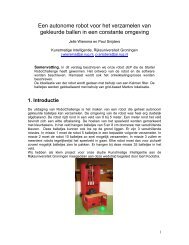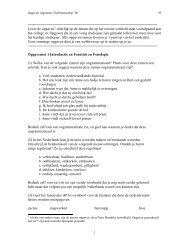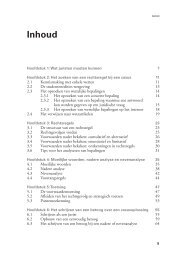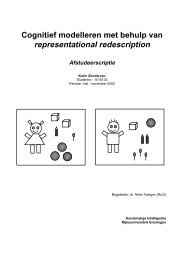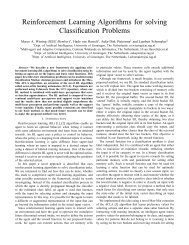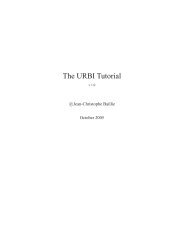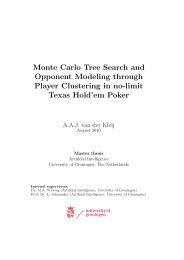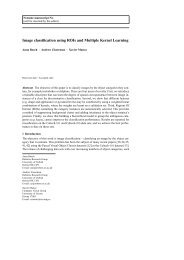Presuppositions in Spoken Discourse
Presuppositions in Spoken Discourse
Presuppositions in Spoken Discourse
Create successful ePaper yourself
Turn your PDF publications into a flip-book with our unique Google optimized e-Paper software.
Chapter 4<br />
directions, it is necessary to more frequently use a full presuppositional expression<br />
rather than an anaphoric expression for clarity. The presupposition is able to<br />
summarize or jo<strong>in</strong> together this scattered <strong>in</strong>formation. That bound presuppositions<br />
can have these k<strong>in</strong>d of functions is not surpris<strong>in</strong>g, because their anaphoric<br />
alternatives, abstract object anaphoric reference, can have them as well. But the<br />
bound presuppositions can do it better, <strong>in</strong> more situations, because they have a<br />
greater descriptive content which allows them to <strong>in</strong> a more precise or ref<strong>in</strong>ed way<br />
identify exactly what previously given <strong>in</strong>formation is <strong>in</strong>tended.<br />
Another communicative function some of the examples of presuppositional<br />
b<strong>in</strong>d<strong>in</strong>g seems to show is stat<strong>in</strong>g some k<strong>in</strong>d of conclusion that is deducible or<br />
<strong>in</strong>ferable from the discourse record. The presupposed proposition, because parts<br />
of it have already been <strong>in</strong>troduced <strong>in</strong> the discourse may possibly be hearer-known if<br />
the hearer has been attentive and has made the correct conclusions. This is not<br />
always certa<strong>in</strong> however and the presupposition <strong>in</strong>creases redundancy.<br />
The follow<strong>in</strong>g example illustrates a case where the full presuppositional<br />
expression <strong>in</strong>creases clarity. The abstract object referred to is only <strong>in</strong>ferable and not<br />
fully expressed. Speaker B is tell<strong>in</strong>g a story to Speaker a. Speaker C also knows the<br />
story. Speaker B knows that the <strong>in</strong>formation communicated is new to Speaker a,<br />
but is unsure if the <strong>in</strong>formation presupposed will be hearer-new or not. This is<br />
because it is <strong>in</strong>ferable from the earlier context (if you are put on probation you<br />
must have been prosecuted <strong>in</strong> court), but the whole focus of this po<strong>in</strong>t <strong>in</strong> the story<br />
is that this conclusion was not understood by Fan, a friend of the speakers. Speaker<br />
B’s addition, where she aga<strong>in</strong> makes the premiss-conclusion connection more clear<br />
by repeat<strong>in</strong>g it. This further confirms that the speakers seem to be unsure if<br />
Speaker C will be able to make the same conclusion that Fan was not able to make.<br />
(16) factive, triggered p: “she must also have been up before the court” (1-13 681)<br />
Speaker a *( - laughs)*~|<br />
Speaker B *And he was* , put <strong>in</strong> gaol. I said to Fan, well I don‘t like to rub it <strong>in</strong>, but<br />
- it must have been some {huge} affair, because - what {Fan didn‘t}<br />
realize, not be<strong>in</strong>g a lawyer, or a lawyer‘s wife - that apparently the wife<br />
was put on probation. So that Fan [?] Fan didn‘t realize that that she<br />
must also have been up {before the court}, you can‘t be put on<br />
probation, *.<br />
Speaker C *Oh yes, she was* prosecuted too, +( . coughs) ,<br />
Speaker B + burnt the books+, when she *knew that*…<br />
Speaker a *For help<strong>in</strong>g* to fiddle the <strong>in</strong>come tax~|<br />
Speaker B ( . coughs) *Well, she must have known about it.<br />
Multi-speaker dialogue may need to use presuppositions this way because<br />
establish<strong>in</strong>g <strong>in</strong>formation as mutually known is a more complex task when several<br />
discourse participants are <strong>in</strong>volved than when only two participants are <strong>in</strong>volved.<br />
All conclusions may or may not have been realized by all discourse participants. In<br />
fact, it would be strange if we would not need to explicitly conclude th<strong>in</strong>gs on<br />
occasion, as a form of ground<strong>in</strong>g. Let’s look at a similar example of another bound<br />
propositional presupposition, the presupposition <strong>in</strong>duced by the it-cleft below.<br />
80


